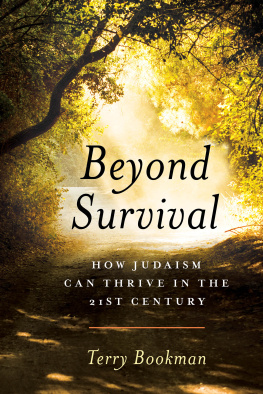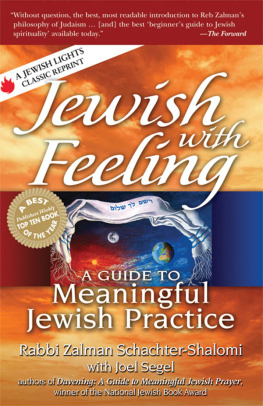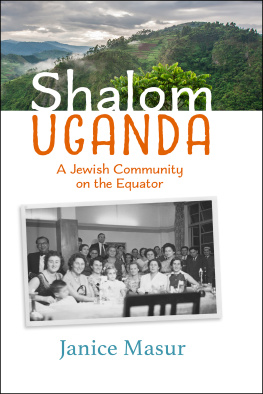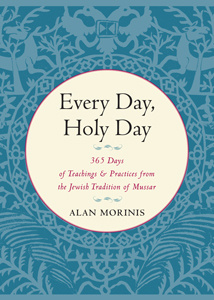Beyond Survival
Beyond Survival
How Judaism Can Thrive in the 21st Century
Terry Bookman
ROWMAN & LITTLEFIELD
Lanham Boulder New York London
Published by Rowman & Littlefield
An imprint of The Rowman & Littlefield Publishing Group, Inc.
4501 Forbes Boulevard, Suite 200, Lanham, Maryland 20706
www.rowman.com
6 Tinworth Street, London SE11 5AL, United Kingdom
Copyright 2019 by The Rowman & Littlefield Publishing Group, Inc.
All rights reserved . No part of this book may be reproduced in any form or by any electronic or mechanical means, including information storage and retrieval systems, without written permission from the publisher, except by a reviewer who may quote passages in a review.
British Library Cataloguing in Publication Information Available
Library of Congress Cataloging-in-Publication Data
Names: Bookman, Terry, author.
Title: Beyond survival : how Judaism can thrive in the 21st century / Terry Bookman.
Description: Lanham ; Boulder ; New York ; London : Rowman & Littlefield, [2019] | Includes bibliographical references and index.
Identifiers: LCCN 2018055316 (print) | LCCN 2018055667 (ebook) | ISBN 9781538122334 (ebook) | ISBN 9781538122327 (cloth : alk. paper)
Subjects: LCSH: JewsIdentity. | JewsCivilization. | Judaism21st century.
Classification: LCC DS143 (ebook) | LCC DS143 .B68 2019 (print) | DDC 305.892/4dc23
LC record available at https://lccn.loc.gov/2018055316
 The paper used in this publication meets the minimum requirements of American National Standard for Information SciencesPermanence of Paper for Printed Library Materials, ANSI/NISO Z39.48-1992.
The paper used in this publication meets the minimum requirements of American National Standard for Information SciencesPermanence of Paper for Printed Library Materials, ANSI/NISO Z39.48-1992.
Printed in the United States of America
Beyond Survival
A New Jewish Vision
I n his latest novel, Here I Am , Jonathan Safran Foer writes,
Survival has been the central theme of Jewish existence since the beginning, and not because we chose it to be that way. We have always had enemies, always been hunted. Its not true that everyone hates Jews, but in every country weve ever lived, in every decade of every century, we have encountered hatred.... We are a traumatized people. And nothing else has traumas power to deform the mind and heart.
I believe this assessment is quite accurate. We Jews have become the worlds experts on how to survive. Beginning with the pharaoh of Egypt, immortalized in our retelling of the story at every Passover seder , there have been numerous genocidal attempts to eliminate our people from the face of the earth and the annals of history. All have failed. We are still here. And those who attempted to destroy us are gone, their names all but erased from human history. To paraphrase the familiar trope, survival is our middle name. Even the Dalai Lama, when faced with the reality that his people would be in exile from Tibet for an undetermined amount of time, sought the counsel of numerous Jewish leaders. We always talk of the Jewish people scattered in so many countries, speaking so many languages, the Dalai Lama said in English, sometimes seeking the right word from a Tibetan translator. Yet the Jews keep their traditions. It is something very admirable. In essence, he wanted to learn our secret technique of survival. And yet, survival has come at enormous cost to our collective psyche.
But what if this is a moment in time that calls for a different skill or a different muscle? With the burgeoning of interest in Judaism, with the recently revealed 2014 Pew Commission finding that Judaism is the most favorably viewed religion in the United States, with the strides Israel has taken to become a world economic, scientific, technological, medical, and military power, as well as one of the worlds most popular tourist destinations, is it time for a major paradigm shift, a change of narrative, one that will take us beyond survival to truly thriving? We who have learned the art of surviving any and all circumstances now have an opportunity to thrive. Can we seize the moment? Are we capable of accepting this new possibility, this new identity? Can the worlds number one expert survivalists now embrace thriving? Thus far, call it suspicion or centuries of experience, with rare historical exceptions, we have done a terrible job at thriving. That muscle either does not currently exist or is so severely underdeveloped that we do not know how to use it. But today there is a new reality. We Jews need to get that in almost every place we live, we enjoy privileged status.
We know how to protect ourselves from those would-be haters; how to circle the proverbial wagons and keep them out while we make the center strong and safe; and even how to turn their pejoratives into a badge of honor. When they called us bookish, we prided ourselves on our intellectual acumen. When they called us cheap money grubbers, we became generous philanthropists. But what if they love us as well as our children? What if they see marrying into our families as a good thing? What if they want to build world-class Jewish studies departments and, instead of quotas to keep us out, recruit as many of our kids as possible? This is not merely a hypothetical. Some years ago, I believe it was 2002, while attending the Union of Reform Judaisms biennial meeting, I took some time to see the vendors and information booths, which is one of my favorite things to do at this gathering. All right, I was shopping as well! Imagine my surprise when the very first booth, usually the most expensive one as well, was Vanderbilt University, announcing the launch of its new Jewish Studies Department! Vanderbilt, that bastion of southern gentility, was actively recruiting Jewish students. Its founders must have been rolling in their graves, yet today there is a large and active Jewish student population and a wonderful, world-class library as well. One can even major in Jewish and Holocaust studies. Now Vanderbilt is considered one of the best places for Jewish kids to go to college. Who would have thunk it?
In the 2016 American presidential election, both candidates boasted of their Jewish in-law sons and their grandchildren who were being raised as Jews. And, significantly, it was no big deal! It was hardly talked about in any news outlet. And as for Bernie Sanders, if not for an occasional question from the press, the fact that he was a Jew was rarely mentioneda total This time? Normal! The times, they have changed. Can we adapt to this new reality?
The common historical perception of the Jewish people (announced in the Torah and bolstered in large measure by the Holocaust) is that our two thousand years of Diaspora has been one of exile, suffering, and persecution. Indeed, we Jews have been oppressed. Our very existence too often rode on the whims and economic fortunes of despotic leaders. Yet, a truer examination of our history would highlight notable examples of our peoples capacity to truly thrive. After all, before the expulsion we called our experience The Golden Age of Spain. Our people thrived for centuries in Babylonia, Germany, and Amsterdam, making timeless contributions to our collective culture and history. The Babylonian Talmud, the poetry and liturgy of our prayer book, the great Yeshiva (literally, place of sitting, but for all intents and purposes, simply a school) academies, the mystical tradition of Kabbalah (literally, received, the term used for the collective mystical tradition in Judaism), the exploration of the Americas are just a few. In other words, when circumstances and the opportunity present itself, we know how to get beyond survival. The thesis of this book is that now is such a time.
Please allow me, then, to sketch a portrait of what thriving might look like for us. Back in the 1990s, I consulted with a synagogue whose members had a reputation for having a kind of snobbish and go-it-alone attitude in the community. When I pointed out that their exit sign read Do Not Enter, they did not believe me. Even when I led them on a mini field trip to see the sign, they were in denial. And, in fact, it took them another five years to change the sign!
Next page









 The paper used in this publication meets the minimum requirements of American National Standard for Information SciencesPermanence of Paper for Printed Library Materials, ANSI/NISO Z39.48-1992.
The paper used in this publication meets the minimum requirements of American National Standard for Information SciencesPermanence of Paper for Printed Library Materials, ANSI/NISO Z39.48-1992.